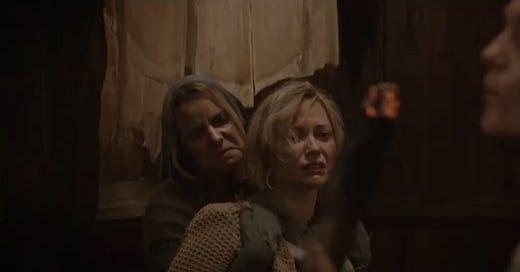Heartland: Where We Disappear

For tickets/showtimes or more info about Heartland Film Festival, click here.
"Something always breaks," claims the tagline of this Siberian gulag-set drama, a reference to the effects on one's body and mind of the deathly cold prison camp in which our hero, Anastasia, resides. The phrase also recurs throughout the movie, as the words of a fellow prison mate ring in Anastasia's mind. It seems to be Where We Disappear's fulcrum for tension—the hopeless promise of an inevitable tipping point, at which Anastasia's fortitude, along with the rising stakes of the story, will come tumultuously crumbling in on itself. It is a convincingly felt sentiment, thanks to the actors' weary performances.
And yet, Where We Disappear never depicts the harrowing hardships in a visceral enough way to allow that tension to creep inside one's mind any further than superficial sympathy for our main characters. I'm not asking for on-screen violence, necessarily, but the film's choice to talk about adversity rather than show it or even visually allude to it undercuts the tension, especially in light of a stagey and on-the-nose screenplay from Arthur M. Jolly.
The story focuses on Anastasia (Georgina Haig) being sent to the gulag after she murders her brutish and likely physically abusive husband who has returned from war. In prison, she meets her bunk mates: four other women with trauma, guilt, and resentment all their own. Most prominent, due to her commanding presence and physical superiority, is Masha (Jolene Anderson). Masha's futilistic mentality about their prison sentences means that she scoffs at anyone's attempt to resist or escape the torturous punishment. She especially hates Anastasia, whose fiery conviction functions as a symbol for, in Masha's mind, misplaced optimism and naiveté. The five women clash, mostly under the manipulation and coercion of Masha, while Anastasia attempts to get them to work together to earn their freedom.
Calling Jolly's script "stagey and on-the-nose" was not to say his writing is without strength. There is a certain poetic ebb and flow to the way the prisoners reveal themselves to each other and to us. I'd liken his writing almost to that of Jonathan Nolan or Terrence Malick in its grandiose, mythic style, but closer to Nolan in its trouble balancing that grandiosity with believability and humanity. At times, the prisoners are far too elegant in their speech and behavior to be fully convincing in their pain and trauma.
Likewise, director Simon Fink often stages things in too perfect a way, such that the atmosphere of dread and despair is broken by bland blocking and pulled punches, physically and subtextually.
In all, Where We Disappear is an interesting character study and examination of resilience, even if all too familiar and safe for its own good. The finale 20 minutes elevate the film with some surrealism and ambiguity, but I could have stood for more of that throughout. The film did make me feel kind of cold, though, so I'd argue Fink and crew managed to work at least *some* movie magic on me.
https://www.youtube.com/watch?v=174UPAstndo&w=585



